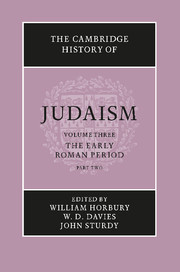Book contents
- Frontmatter
- 1 The archaeology of Palestine 63 bce–ce 70
- 2 The Herodian Temple
- 3 Recent archaeology in Palestine: achievements and future goals
- 4 The contribution of Jewish inscriptions to the study of Judaism
- 5 The social, economic and political history of Palestine 63 bce–ce 70
- 6 The Diaspora in the Roman period before ce 70
- 7 The Gentiles in Judaism 125 bce–ce 66
- 8 Gentiles as seen by Jews after ce 70
- 9 The synagogue
- 10 The Temple and the synagogue
- 11 The early liturgy of the synagogue
- 12 Women in the synagogue
- 13 The Pharisees
- 14 The Sadducees – their history and doctrines
- 15 The Essenes
- 16 The baptist sects
- 17 The troublemakers
- 18 The Samaritans and their sects
- 19 Galilean Judaism and Judaean Judaism
- 20 Jesus: from the Jewish point of view
- 21 Paul: from the Jewish point of view
- 22 Jewish Christianity
- 23 Apocalyptic: the disclosure of heavenly knowledge
- 24 The Qumran sectarian writings
- 25 The Dead Sea Scrolls and pre-Tannaitic Judaism
- 26 Prayer in the Qumran Texts
- 27 Philo of Alexandria
- 28 Josephus (ce 37–c. 100)
- 29 The rabbi in second-century Jewish society
- 30 The Hellenistic–Roman Diaspora ce 70–ce 235: the archaeological evidence
- 31 The legacy of Egypt in Judaism
- 32 Jewish elements in gnosticism and magic c.ce 70–c.ce 270
- Bibliographies
- Index
- References
27 - Philo of Alexandria
Published online by Cambridge University Press: 28 March 2008
- Frontmatter
- 1 The archaeology of Palestine 63 bce–ce 70
- 2 The Herodian Temple
- 3 Recent archaeology in Palestine: achievements and future goals
- 4 The contribution of Jewish inscriptions to the study of Judaism
- 5 The social, economic and political history of Palestine 63 bce–ce 70
- 6 The Diaspora in the Roman period before ce 70
- 7 The Gentiles in Judaism 125 bce–ce 66
- 8 Gentiles as seen by Jews after ce 70
- 9 The synagogue
- 10 The Temple and the synagogue
- 11 The early liturgy of the synagogue
- 12 Women in the synagogue
- 13 The Pharisees
- 14 The Sadducees – their history and doctrines
- 15 The Essenes
- 16 The baptist sects
- 17 The troublemakers
- 18 The Samaritans and their sects
- 19 Galilean Judaism and Judaean Judaism
- 20 Jesus: from the Jewish point of view
- 21 Paul: from the Jewish point of view
- 22 Jewish Christianity
- 23 Apocalyptic: the disclosure of heavenly knowledge
- 24 The Qumran sectarian writings
- 25 The Dead Sea Scrolls and pre-Tannaitic Judaism
- 26 Prayer in the Qumran Texts
- 27 Philo of Alexandria
- 28 Josephus (ce 37–c. 100)
- 29 The rabbi in second-century Jewish society
- 30 The Hellenistic–Roman Diaspora ce 70–ce 235: the archaeological evidence
- 31 The legacy of Egypt in Judaism
- 32 Jewish elements in gnosticism and magic c.ce 70–c.ce 270
- Bibliographies
- Index
- References
Summary
Of all the Jews who have written in Greek, Philo of Alexandria is undoubtedly the greatest on account of the breadth and richness of his ideas, the number of his works and his brilliant literary qualities. No other author in antiquity has attempted with so much boldness the confrontation and symbiosis of Judaism with another philosophy and another culture. This, one would think, would have assured his work and his personality a posthumous life among the generations of Jews which have followed him throughout the Mediterranean. However, in general Judaism knew absolutely nothing about him for fifteen hundred years, until in the sixteenth century Azariah ben Moses dei Rossi, a man of great learning who knew little Greek but who read in the Latin translation all the ancient Greek writers, including the Fathers of the Church, revived his name and his writings.
These writings, however, had not disappeared in the course of so many centuries; Christians from the beginning knew of them, made use of them and copied the manuscripts until the printed editions of the Renaissance; in 1552, Adrien Turnèbe published the whole of Philo's treatises in Paris for the first time. But it is above all in the nineteenth century that Philo gradually came to have an increasingly important place in the history of religious and philosophical ideas, as also in literary history. For a century, one study has followed another: sometimes detailed monographs as Zeller already attempted when he devoted nearly a hundred pages to Philo in his monumental Philosophie der Griechen (vol. iii.2, Tübingen, 1852; edn 5, Leipzig 1923); sometimes one-sided essays which overlook the complexity of a man who is both a Greek philosopher nurtured by Judaism and also a Jewish thinker moulded by Greek culture, and which claim to sum up the character of this astonishing personality in a word by choosing one of the alternatives Greek or Jew.
- Type
- Chapter
- Information
- The Cambridge History of Judaism , pp. 877 - 900Publisher: Cambridge University PressPrint publication year: 1999
References
- 4
- Cited by

